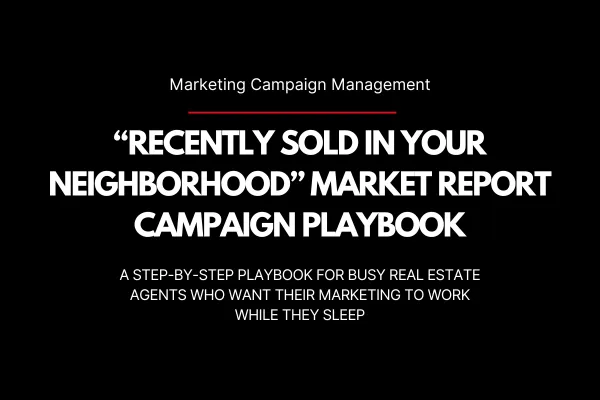
PLAYBOOK: Launch Your “Recently Sold in Your Neighborhood” Market Report Campaign
This hybrid approach leverages a gated “Recently Sold in Your Neighborhood” PDF report and hyperlocal circle prospecting to capture high-intent seller leads.
Use this integrated framework to capture, engage, and convert prospects using inbound content and outbound outreach to build a steady pipeline of listing appointments every 30 days.
Step 1: Create Your “Recently Sold in Your Neighborhood” Market Report
What Is A “Recently Sold in Your Neighborhood” Market Report
Hyper-local market reports featuring recent sales, price trends, and “off-market” opportunities delivered as premium content in exchange for contact details and a selling-timeline qualifier.
Why This Offer Works
This approach taps into homeowners’ fear of missing out (FOMO) and desire for exclusive insider information they can get easily using resources that are open to the public. It positions you as the neighborhood expert with insider access to data and market insights.
Offer Performance Stats
Neighborhood reports outperform generic market reports by 340%
Average contacts-vs-downloads conversion rate: 67.2%
Title: [Month] Market Snapshot: Homes Sold in [Neighborhood]
Recent Sales (Last 30 Days)
[Street Address 1] – Sold for $[Price] on [Date]
[Street Address 2] – Sold for $[Price] on [Date]
[Street Address 3] – Sold for $[Price] on [Date]
Average Price/Sq Ft Trend
This month: $[CurrentAvg]/sq ft
Last month: $[PriorAvg]/sq ft
Change: [▲/▼][% Change]
[Insert simple bar or line chart of last 3 months’ Avg $/sqft]
Off-Market “Coming Soon” Listings
[Address A] – Estimated list $[Price]
[Address B] – Estimated list $[Price]
What It Means for Your Home
Demand is [strong/moderate/soft], driving values [up/down]
Homes priced within 5% of market sell in [#] days on average
Step 2: Build A Landing Page Dedicated To The Offer
Headline: “Get the September Market Report for [Neighborhood] Before Your Neighbors Do”
Form fields (3 max):
Name
Email
Mobile Phone
Property address (to qualify)
CTA Button Text: “Send My Free Report”
CTA Button Sub Text: Add Scarcity cue: “Only 50 personalized reports released per month”
Metrics to Track
Cost per lead: $15–30
Lead capture rate: 20–25%
Lead-to-appointment: 25–30%
Appointment-to-listing: 40–50%
Step 3: Launch 1-to-Many Promotional Campaign
Broadcast your “Recently Sold in Your Neighborhood” Market Report through online and offline. Aim to generate 20,000+ impressions and convert 20–25% into qualified leads—research suggests this is achievable for any local market across the US.
Define The Target Audience For Your Campaign
Core : 3,000–5,000 homeowners within a 1-mile radius of your target neighborhood.
Expansion: Layer in “likely to move” and “home improvement” interest groups in adjacent ZIP codes.
Lookalikes: Create a 1% lookalike audience from your past 100 seller contacts.
Allocate Your Budget & Channels
Facebook & Instagram Ads (40% of budget)
Spend $600–900 at $8–12 CPM to deliver 10,000–12,000 impressions.
Frequency cap: 3× per person.
Google Search Ads (15% of budget)
Spend $180–270 at an average CPC of $2–$3 to generate 3,000–4,500 impressions and 90–135 clicks per month.
Target keywords: “[Neighborhood] home value,” “homes sold near me,” “what’s my house worth [zip code].”
Direct clicks to your dedicated offer landing page.
Google Display Ads (20% of budget)
Spend $300–450 to generate 5,000–7,000 impressions.
Direct Mail Door-Hangers (20% of budget)
Drop 1,500 pieces at $0.75 each to achieve 1,000–1,200 impressions.
Use unique QR code linking to a dedicated landing for attribution.
Retargeting Ads (5% of budget)
Serve to website visitors and partial form completers to boost conversions.
Metrics To Track
Impressions ≥20,000/month
Click-Through Rate ≥2.5%
Cost Per Lead $15–30
Lead Capture Rate 20–25% (downloads ÷ clicks)
Email Open Rate ≥40%
Click-to-Schedule Rate ≥20%
Inbound Appointment Rate ≥25%
Time to First Response <2 hours
Step 4: Launch 1-to-1 Outbound Marketing Campaign
Daily Outbound Routine (Days 3–30)
Create Your Contact List
Pull new “Report Downloaders” and all homeowners within a 1-mile radius of each recent sale
Tell Them About Your Offer
Call/Voicemail Script:
“Hi [Name], it’s [Your Name]. I just sent you our exclusive September Market Report for [Neighborhood]. Your home at [Address] matches the one on [Street] that sold for $XXK above asking. Would you like a personal estimate of your home’s value in today’s market?”Text Follow-Up:
“This is [Name]—did you see the market report I emailed? I can share a custom estimate based on your address if you reply YES.”Door-Hanger Drop:
“Just sold nearby! Scan for your free neighborhood report & 15-min consult.” with QR code
Metrics to Track
Calls/day: 50
Texts/day: 50
Door-hangers/day: 20
Response rate goal: 12–15%
Appointment rate: 35–45% of responses
Step 5: Set Up Follow-Up Email Sequence for Inbound Leads
Nurture inbound prospects with a four-touch email campaign that delivers value, builds urgency, and drives scheduling—all within 10 days.
Pro Tips
Personalize subject lines with recipient’s name or neighborhood.
Use clear, benefit-driven CTAs in buttons.
Send from your personal email address to boost open rates.
Automate follow-ups but monitor for hot leads to call within 2 hours.
Fast Start Email Sequence
Email #1: Immediate Delivery (Within 1 Hour of form submission)
Subject: “Here’s Your [Month] Market Report for [Neighborhood]”
Body:
Link to download report
Brief overview of key insights (“See pages 2–3 for recent sales”)
Clear CTA button: “Schedule Your Free 15-Min Consultation”
Email #2: Day 2 Reminder - Wait One Day Then Send
Subject: “3 Sale Highlights from Your Report”
Body:
Bullet out the top three recent sales and why they matter
Reinforce benefit: accurate pricing, faster sale
CTA: “Book Your Consultation Now”
Email #3: Day 5 Social Proof - Wait 2 days then send
Subject: “Case Study: Sold for $X Above Asking in [Neighborhood]”
Body:
Short success story with numbers and timeline
Quote/testimonial from the homeowner
CTA: “See How We Can Do the Same for You”
Email #4: Day 10 Final Push
Subject: “Last Chance: Free Consult Slots Fill Fast”
Body:
Urgency cue: “Only X slots left this month”
Restate value: personalized market insights
CTA: “Claim Your Free Consultation”
Metrics to Track
Email Open Rate ≥40%
Click-to-Schedule Rate ≥20%
Inbound Appointment Rate ≥25%
Step 6: Evaluate, Optimize & Scale Your Campaign
Treat each marketing campaign as an experiment—deliver one offer, to one specific target audience.
Review numbers weekly (CPL, response, appointments, listings)
Compare the numbers you need to achieve on each metric in order to align to your commission goals to determine whether the campaign results are on track with your sales commission goals.
Calculate your marketing ROI for each month:
Marketing ROI Calculation Formula: (Net commission ÷ Marketing expenses) × 100%.
Add up all of the above costs plus your ad spend.
Divide your total marketing investment by the number of closed listings generated by those campaigns.
Compare to your average commission per listing to get net profit.
To calculate true ROI, factor in all direct and indirect expenses—beyond just your ad spend—so you know exactly what each listing appointment really costs you. This holistic view ensures you’re not underspending or overspending—and that every dollar you invest in both digital and face‐to‐face marketing drives profitable listing appointments.
Common Direct & Indirect Expenses For Real Estate Marketing
Direct Mail & Print Collateral
Postcards, flyers, brochures, door‐hangers: printing and postage fees
Business cards and branded giveaways
Networking & In‐Person Outreach
Coffee, lunch, or happy‐hour meetups with prospects (meal costs)
Event sponsorships (local sports teams, charity events)
Entry fees for chamber mixers or industry luncheons
Branded signage and table rentals for events
Open House Expenses
Signs, directional arrows, and printed property sheets
Refreshments, snacks, and staging décor rental
Photographer or videographer fees (if you include virtual tours)
Technology & Software Subscriptions
CRM and email‐marketing platform fees
Landing‐page builders, form plugins, and analytics tools
Scheduling software for booking consultations
Vehicle & Travel Costs
Mileage and fuel for door‐knocking, showings, and networking trips
Parking and toll fees
Time & Labor
Value of your time spent on phone calls, follow‐ups, and in‐person visits (e.g., $50–$100/hour)
Assistant or VA hourly costs for managing campaigns, mail drops, and data entry
Miscellaneous
QR‐code printing and tracking services
Gifts or closing‐gift expenses used as incentives
What to Do When Your Campaign Is Not Hitting Goals
Most campaigns underperform initially.
Implementation Notes:
Check metrics weekly in CRM and ad platform.
Apply only one fix per week and only change one element per fix.
Run each test ≥7 days or until 200 impressions.
Follow this optimization order:
Checkpoint 1: Are enough prospects seeing your offer?
Problem: Low Awareness (#)
Metric to Check: Reach, Impressions
Solution: Tell More Prospects About Your Offer
Improvement Experiments
1-on-1 Marketing: Share the link to opt-in for your market report, the outcome it’s designed to deliver, and a request to sign up to all of the contacts in your phone.
Paid Ads (1-to-Many Marketing): Increase ad budget 20%
Checkpoint 2: Are enough prospects visiting your landing page?
Problem: Low Web Page Visits (#)
Metric To Check: Click-Through Rate (CTR), Unique Web Page Visits
Solution: Improve Prospect-Message Fit
Improvement Experiments
Test adjusting your prospect targeting (ex. ZIP-code or demographic characteristics)
Test an “avoidance” rather than “gain” headline on ads
Test new ad images that paint a clearer picture of the pain your offer helps your target audience avoid
Checkpoint 3: Are enough visitors requesting your lead magnet?
Problem: Low Form Fill Conversions (%)
Metrics To Check: # Unique Web Page Visitors, # of Form Submissions
Solution: Make Sure Visitors See What They Were Promised (And Nothing Else) When They Land On Your Web Page
Improvement Experiments
Test making landing page headline more identical to your “offer pitch”
Test removing any content on the landing page that is not related to the offer.
Test new landing page images that paint a clearer picture of the transformation your offer helps your target audience achieve
Test adding “bonuses,” “scarcity,” and “urgency” to incentivize redemptions
Test reducing # of fields on your redemption form to Max 3
Test changing your offer
Checkpoint 4: Are enough lead magnet requests turning into appointments with you?
Problem: Low Booking Conversions (%)
Metrics To Check: # of Form Submissions, # of Listing Appointments
Solution: Increase # of follow ups; Improve Appointment "What's In It For Me" (WIFM)
Experiment Examples
Test increasing from 4 to 12 follow up emails in your email sequence
Test adding phone, text, and in-person follow-ups to your mix
Test adding “bonuses,” “scarcity,” and “urgency” to incentivize appointment bookings
Test new headlines on follow-up emails
Test new intros on follow-up emails
Checkpoint 5: Are enough appointments turning into listings with you?
Problem: Low Listing Conversions (%)
Metrics To Check: # of Appointments, # of New Listings
Solution: Increase # of follow ups; Improve Listings "What's In It For Me" (WIFM)
Experiment Examples
Test increasing from 4 to 12 follow up emails in your email sequence
Test adding more phone, text, and in-person follow-up touches to your communication plan
Test adding “bonuses,” “scarcity,” and “urgency” to incentivize appointment bookings
Test new headlines on follow-up emails
Test new closing script for listing appointments
What to Do When Your Campaign Is Meeting or Exceeding Goals
Key Rules for Scaling
Maintain your original cost-per-lead goal.
Track each new audience separately with CRM tags.
Halt any scale test if cost-per-lead exceeds your target.
Two Scaling Decision
When performance is consistent, scale using one of the following methods:
Scale Vertically
Increase budget by ≤50% every 7 days.
Pause increases once cost-per-lead stops improving.
Scale Horizontally
Expand into new segments: lookalike audiences from top ZIP codes or age groups.
Add related interests (e.g., “home improvement,” “moving services”).
Test additional channels: direct mail, geo-fencing ads, door-hangers.





